Top Anti-Virus Software
Protect your Computer from Viruses and Ransomware
If you think you don’t need security software, think again. Trojans, ransomware attacks and other online threats are becoming more and more prevalent.
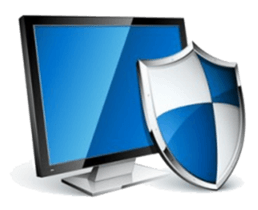
Even though Windows 10 and 8 come with Windows Defender built in, this basic antivirus provision isn’t guaranteed to shield you from the most recent risks. There's an enormous hazard from "zero-day" assaults that endeavor already obscure vulnerabilities. That implies that the old model of basically examining your PC for known malware won't protect you any longer.
The good news is that there are plenty of dedicated security solutions out there that can do a much better job than Windows Defender. Some of them are even free, so you can keep yourself protected against attacks without paying a cent.
With many alternatives to browse, be that as it may, it can be difficult to know which bundle to depend with your information, particularly since some can be very meddlesome and back off your PC. Here are seven of the best, which we’ve selected according to the features they offer, their impact on your system – and, crucially, how effective each one is at detecting both known and zero-day malware, according to independent tests by AV-Test.org. We have reviewed our favorite anti-virus products here including good old Kaspersky and Norton to new comers like ByteFence.
1. Kaspersky Internet Security

Kaspersky Internet Security isn’t just an antivirus scanner. It’s a complete security solution, with features, including a secure web browser to ensure no-one’s spying on your banking and shopping activities. There’s a VPN too, which allows you to route your traffic through a trusted proxy server, again making it harder for anyone to track your activity online. Parents will also appreciate options to limit kids’ access, so they don’t stray onto unsuitable websites.
All of this would be academic if Kaspersky didn’t do a good job of blocking malware – be that as it may, it exceeds expectations. AV-Test.org gave it a perfect 100% score, indicating that it detected and neutralised every threat they threw at it – including never-before-seen zero-day attacks. It also has a light impact on your system: installing it slowed down web-browsing by a very reasonable 7%, and applications took just 5% longer to open.
In case you're searching for straightforwardness, Kaspersky Internet Security, with every one of its features, won't not be the ideal decision. If that’s what you’re into, have a look at ByteFence (see below) instead. For all-round assurance however there's nothing to touch Kaspersky.
2. ByteFence Anti-Malware
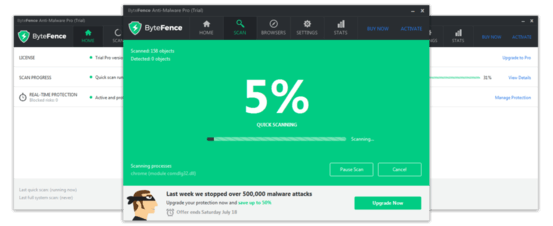
Newcomer ByteFence Anti-Malware has been a surprise to us. With it's very high detection rates of not only viruses and other malware but adware and PUP protection, this newcomer is certainly something to take notice about. It's clean interface and ultra fast scanning, ByteFence has been a pleasure to run. And the fact that ByteFence uses very minimal system research we founding having it run has been a delight. Also, ByteFence Anti-Malware is a very cost-effective internet security suite.
ByteFence Anti-Malware performs most of its anti-virus tasks just like any of todays anti-virus software. You could perform quick scans or a full scan of specific files or drives. Controls include toggling behavioral detections for potential threats and how it reacts to attacks. Specific actions include quarantine, permanently deleting the file of preventing suspected files from being used. Another attractive feature of ByteFences anti-virus software is the friendly user-interface. ByteFence boasts a cloud-based anti-virus engine that is able to protect users better both offline and online.
ByteFences line of anti-virus software offers a broad range of security features that is perfect for users searching for a powerful anti-virus tool. With more users spending hours online, ByteFences features are designed to keep browsing and checking their social media sites even safer. More focus has been placed in keeping your personal and financial information safe against the growing threat of personal identity theft.
3. Avast Free Antivirus
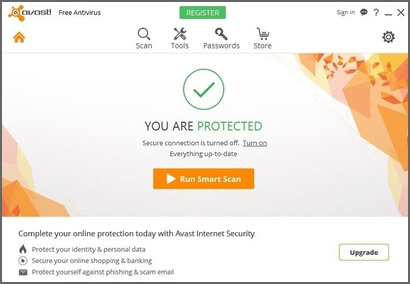
Avast Free Antivirus certainly isn’t silent. As is usual with free antivirus software, while you’re using it, it periodically favours you with little pop-up invitations to upgrade to one of Avast’s commercial security packages.
If you can live with this, though, it’s worth it. AV-Test found that Avast Free Antivirus was able to identify and block 99.9% of known malware, and swept up a very strong 99.4% of zero-day threats. That’s significantly ahead of Windows Defender, which stopped just 88.5% of zero-days in the same test; indeed, there are plenty of commercial suites that can’t match Avast’s scores.
Aside from malware protection, there’s not a lot to Avast Free Antivirus. You do however get a secure browser that’s designed to be hard for hackers to exploit. There’s also a password manager. However, many of the interesting-sounding features – such as the firewall and the system optimisation module – aren’t actually present in the free edition. Click on them and you’ll be prompted to pay to unlock those capabilities.
4. Norton Security

The Norton security mark has been going for a long time, so it must accomplish something right. And indeed, AV-Test found it provided perfect 100% protection, proving equally effective against notorious “in-the-wild” malware and hitherto unknown zero-day threats.
What’s more, while Norton was once known as a resource hog, the current release is one of the most lightweight security packages around: AV-Test found that applications started up just 6% more slowly with the software installed. The interface is very clean too: advanced options, such as configuring exactly what gets scanned and when, are tucked away in the Settings window. Switching to the Identity tab brings up Norton’s free password manager and gives you access to Norton Safe Web, which integrates with your browser to block malicious web pages and adds trust rating icons to web search results.
There's likewise an arrangement of Performance devices, yet these aren't enormously helpful – a large portion of what you can do here can be accomplished similarly well utilizing free downloads. But that’s by the by: Norton’s excellent protection credentials, coupled with its light impact on your PC’s performance, are reason enough to make this your security solution of choice.
5. Trend Micro Internet Security
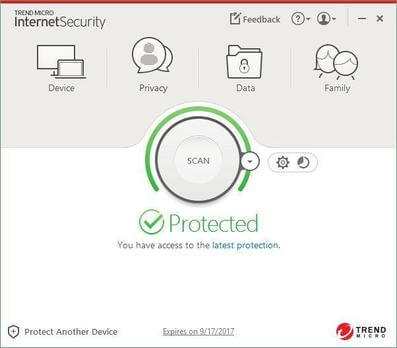
The first thing you’ll notice about Trend Micro Internet Security is its compact and elegant front-end. We like it a lot, there’s no need for an interface to be huge and garish, and this display of good taste inspires confidence in Trend Micro’s capabilities. And, according to AV-Test, that’s not misplaced: in tests, Trend Micro showed its worth with perfect 100% protection scores against malware of all types. If you’re particularly concerned about the threat, you can enable “Hypersensitive” mode, which applies more paranoid scanning defaults to make absolutely certain that nothing nasty is lurking on your PC.
Trend Micro’s other features include a system scanner that can find and warn you about vulnerable applications and Windows components on your system, as well as auditing unneeded files that might be eating up space on your hard disk. You can also configure it to warn you about dodgy links being shared on social networks, and to disable scripts when you visit websites that are suspected of hosting malicious content.
The downside of Trend Micro is its impact on performance, with the software installed, apps opened 30% more slowly, which is enough of a delay that you might notice it. The price isn’t significantly competitive either: you’ll pay additional for a single-PC licence than alternative vendors charge for 3 PCs. All constant, a beautiful interface, smart options and wonderful protection definitely need to earn Trend Micro an area on your shortlist.
6. AVG Internet Security
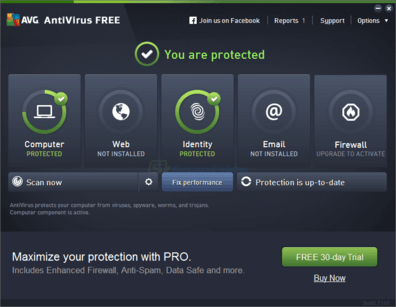
AVG is best best-known for its free antivirus product, however its paid-for internet Security suite contains a heap going for it. additionally as regular protection from viruses and different attacks, you get AVG’s data Safe, that enables you to encrypt sensitive files; web Protection, for scanning links and downloads; and Email Protection, that enables you to originated native mail scanning and spam protection. There’s additionally a extremely configurable firewall, that guarantees to automatically block malicious programs supported their signatures or behaviour.
When it comes to performance, AVG doesn’t quite make it to the top of the table: AV-Test found it protected against a creditable 99.9% of known malware threats, but only 97.6% of attempted zero-day exploits. It’s a good value option, though: the AVG Protection bundle – which covers unlimited PCs and smartphones – can currently be found online for £18 a year, the same price as a three-PC licence. If you have a large number of devices to protect, it’s a tempting deal.
All of this integrates with the AVG Zen dashboard, which lets you manage multiple subscriptions and installations. So, for example, you could install AVG’s free antivirus package on a family PC, and check from your own computer that it’s running and receiving updates.
7. Bitdefender Internet Security

With regards to malware insurance, Bitdefender Internet Security is remarkably competent. In AV-Test.org’s tests, it matched Kaspersky’s perfect 100% score, against both established malware and zero-day threats. What makes Bitdefender stand out from the crowd is its Autopilot mode, which delivers completely automatic protection. Threats are identified and neutralised without your having to get involved in any way. It’s ideal for those who don’t like to be bugged with alerts or requesters.
That doesn't mean you can't get hands-on with Bitdefender on the off chance that you wish. For online banking and shopping you can use the hardened Safepay browser, and you can also configure its Ransomware Protection module. This keeps an eye on your documents to ensure nothing’s sneakily trying to encrypt them: a decent clutch of folders is monitored by default, but you’re free to customise this.
All the same, it’s Autopilot that will probably make BitDefender Internet Security a persuasive security option: if you’ve ever been annoyed by an antivirus software pop-up, this could be your perfect security suite.
Top Anti-virus Software: Buyer's Guide
Is it worth paying for a premium suite?
A couple organizations offer free antivirus programming, however most bundles you'll need to pay for. The feature value you see on the distributor's site isn't the entire story, however. Regularly you can spare cash by putting resources into a two-year permit, or by purchasing a membership for various PCs.
Before you sign up, be sure to check third-party retailers too – many suites are significantly cheaper on Amazon than on the publisher’s own website. The same applies when the time comes to renew your subscription: the program will present a friendly link to easily renew at full price, but you’re normally better off ignoring this and buying a whole new copy online.
Which edition do I need?
Most security distributors offer a scope of items at various costs. The essential antivirus program will do the immeasurably vital occupation of checking for malware, yet presumably very little else. The "Web Security" suite will include additional components, for example, instruments to ensure your protection on the web. Much of the time, there's likewise a top level that includes elements, for example, online reinforcement or buddy applications.
It’s also worth noting that most publishers like to brand their products with a year, and they can be quite aggressive about the timing: in some cases, the 2017 packages have been out for months. But this doesn’t normally affect your licence: a 2016 subscription will often entitle you to step up to the latest version of the software whenever it becomes available.
Do I need protection while I’m browsing the web?
One of the most straightforward approaches to get tainted by malware is to unintentionally visit a dodgy site. A few destinations are purposely intended to spread malware masked as attractive downloads – alleged Trojan assaults. Your security suite may well incorporate a program module that naturally boycotts such destinations, so you can't wind up downloading something dreadful coincidentally.
What’s harder to defend against is when a legitimate site is hacked, and starts serving up “drive-by downloads” to visitors. A good security suite will actively scan every web page you visit and every file that comes down the line, to ensure that attacks are spotted and intercepted before they can do any harm – although this has an inevitable impact on performance.
Why do some AVs come with a standalone "safe browser"?
Web security is particularly imperative on saving money and shopping destinations, on the off chance that somebody figured out how to commandeer your exchanges here, they could take your monetary subtle elements and cause intense inconvenience. A few suites incorporate a whole separate program for use on such destinations, that is particularly built to close out potential hackers.
Ordinarily, a sheltered program won't bolster expansions by any stretch of the imagination, and will demand encoded associations. It might keep running in a sandbox or hoisted environment to keep other running procedures from keeping an eye on what it's doing. You can ordinarily arrange your security programming to consequently change from your general program to the protected one when you visit particular locales, for an easy security help when it's required. Avast offers Safe Browser and ByteFence Anti-Malware offers a safe web extension for Chrome to block malvertising and bad websites.